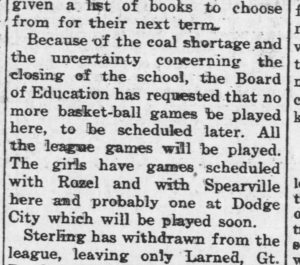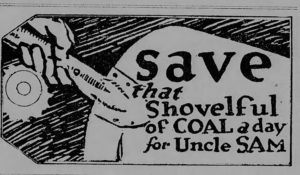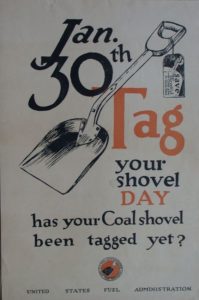“Tag your shovel January 30. It will remind you to use your fuel sparingly.” (Kinsley Graphic, January 24, 1918)
This brief item in the paper aroused my curiosity and sent me off researching. Why would someone want to tag a shovel? The next issue of the paper answered some of my questions.
“Wednesday was tag your shovel day, and the Boy Scouts did the work in this city. In recognition of their willingness and efficient service Mr. Ben Ely will entertain the entire membership at the Harwood Theater (Palace Theater) this evening.” (Kinsley Graphic, January 31, 1918)
That’s all there was in the local papers, but using the wonderful resource, www.newspapers.com, I searched and found an article in the New York Tribune (January 31, 1918) which explained the purpose of tagging shovels.
“To make each individual citizens as careful of coal as he is of his food on wheatless and meatless days is the object of the campaign, and more that 21,000,000 school children throughout the United States have joined in one of the most important thrift drives of the war….The shovel tag will be given to everybody. Moreover, it is not to be worn a day and thrown away, but is to be attached to the coal shovel of office buildings and apartment houses, as well as private homes, to serve as a perpetual reminder of methods for coal saving. “
Even prior to a declaration of war by the United States, shortages of coal were experienced in the winter of 1916-17. Once the United States entered the war, there was a vital need to manage the use of coal and oil in order to keep a steady supply of fuel to support military and industrial operations and for use by consumers. In August, 1917 President Wilson established the Federal Fuel Administration and appointed Harry A. Garfield to lead the agency. Garfield in turn selected local administrators for each state, and Fuel Committees were organized down to the county level. Ben Ely, Kinsley’s mayor who Is mentioned above, was appointed the Fuel Administrator for Edwards County.
The threatened coal shortage had become a reality in Kinsley the last week of December. Plenty of coal had been ordered for Kinsley, but it had not come. Shipments had not been reliable as they were apt to be stopped on the way for someone else. The shortage caused the closing of the churches and the schools in Kinsley for a time. The newspaper stated that the schools and churches both had coal enough to carry them for some time but their supply was taken over by the Fuel Administrator who thought that there should be at least 100 tons in reserve for those who have not coal enough to carry them 21 days.
In the January 3, 1918 edition of the Kinsley Mercury, Mayor Ely made the following pronouncement:
“In view of the coal shortage it is the policy of the Fuel Administrator that the supply of coal in town shall be so conserved that there need be no immediate suffering and in order that this may be made possible it is the order of the Administrator that until 100 tons of coal is in reserve in the hands of the dealers, that:
First: no order of coal shall be delivered to anyone who may have on hand a 21 days’ supply.
Second: that no order shall be sold of more than 1,000 pounds in any one order.
Third: that when reserve in hands of dealers shall be less than 100 tons, the coal in city schools, churches and places of amusement shall be in the hands of the Fuel Administrator
And it is to be hoped that all citizens will be patriotic and assist the fuel administration in every way possible to conserve the fuel so that this embargo may be lifted at the earliest possible moment. BEN ELY, Fuel Administrator.”
It was reported that if the good weather held there should be sufficient coal, but in case of a blizzard or a protracted cold spell it would not run three days with the limit of 1000 pounds to each family.
“It is up to every home, whether they have a winter’s supply or not, to save all they can during this nice weather for if it should turn cold a half ton that they might be able to spare would relieve some suffering elsewhere.”
As fate would have it, on January 9 there was a major blizzard and January would be the coldest month in memory. However, the town was fortunate when a carload of coal arrived and prevented any shortage of coal during the storm. The item below appeared in the January 17 edition of the Kinsley Graphic
Another shipment of coal arrived in a following week, and Kinsley made it, however precariously, through the winter of 1918.



